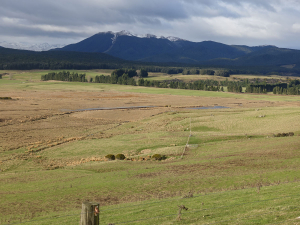State Farmer Delivers Solid Half-Year Result
State farmer Landcorp, trading as Pamu, is a forecasting a full-year net profit of around $100 million.
 Pāmu has reached the 10,000-hectare milestone, with the registration of five blocks on Dale Farm in the Te Anau Basin.
Pāmu has reached the 10,000-hectare milestone, with the registration of five blocks on Dale Farm in the Te Anau Basin.
Pāmu is celebrating a significant milestone in its on-farm biodiversity protection and restoration programme, with over 10,000 hectares of important native habitat now protected in perpetuity with QEII covenants.
QEII covenants (also known as open space covenants) provide permanent legal protection for areas of significant natural, cultural and landscape value.
Pāmu has reached the 10,000-hectare milestone, with the registration of five blocks on Dale Farm in the Te Anau Basin. Dale Farm is a 2,549ha sheep and beef farm in the Upukerora Ecological District.
Pāmu chief executive Mark Leslie says the co-operative aims to be a leader in integrated sustainable land use protecting and restoring the natural world.
He says QEII covenants are a tangible way Pāmu can ensure stewardship of natural assets and the protection of lands and waterways for New Zealand.
"Over 10,000 hectares of QEII covenants is a milestone to celebrate,” he says. “We also have another 6,000 hectares under covenants with the Department of Conservation and other bodies.”
“This approach along with forests on steep hill country and waterway fencing and riparian planting all add up – enabling us to nurture and enrich the land on which we farm. It’s about balancing our performance and the environment for the benefit of generations to come,” says Leslie.
Native vegetation cover in the Upukora district today is much reduced, due to past burning and clearance of large areas of forest, shrubland and tussock land.
The QEII covenants on Dale Farm and other surrounding Pāmu farms are significant as they protect some of the few remaining areas of primary and secondary forest, wetlands, and transitional zones still present in the district.
The Dale Farm covenants protect the habitats of several acutely and chronically threatened indigenous species, including the Nationally Endangered Central Otago roundhead galaxias and At Risk – Declining species such as South Island robin, slender wine sedge, matagouri, and manuka.
Pāmu has a longstanding partnership with the QEII National Trust that has seen a total of 236 covenants put in place on 58 farms, protecting 10,126 hectares in total.
QEII Trust representative Mark Sutton has worked closely with Pāmu for over two decades and says the strong relationship between QEII reps, Pāmu farm managers and Pāmu staff in Wellington has been key to the success.
“Pāmu recognised the need to protect areas of biodiversity on their properties, and putting robust legal protection over these areas underscores their commitment to protect and care for them in perpetuity,” says Sutton. “Their approach, protecting entire sub-catchment systems for future water quality and biodiversity connectedness, is a major achievement.”
“The working relationships developed in my time with Pāmu environmental managers, the late Gerry Soanes and now Gordon Williams, and the farm managers themselves, have been key in securing the 236 covenants so far,” he says.
Pāmu environment manager Gordon Williams says having a biodiversity strategy has assisted the process.
“The strategy has three key pillars: identify all biodiversity worthy of protection; protect it; and enhance it. That has been, and will continue to be, my mantra,” says Williams.
“Both our farm teams and QEII Trust reps are passionate supporters of the process and take much pride in protecting these areas, for the benefit of future generations. The job isn’t done yet, although I do have most of the last few areas for consideration in my sights,” he says.
Each of the Pāmu covenants on Dale Farm, much like the rest of the country, are fenced to a stock-proof standard, giving the areas support to improve to a more representative state. Fencing in the Te Anau Basin is often jointly funded by Pāmu, the Waiau Trust, and QEII.
The Meat Industry Association of New Zealand (MIA) today announced that Chief Executive Officer Sirma Karapeeva has resigned from the role.
The winners of the 2026 Hawke’s Bay/Wairarapa Dairy Industry Awards were announced at the annual awards dinner held at Copthorne Solway Park in Masterton on Thursday evening.
Environment Southland is welcoming this week’s decision by the Environmental Protection Authority (EPA) to approve the release of Blaptea elguetai, a leaf‑feeding beetle that will help control the highly invasive Chilean flame creeper.
This March, the potato industry is proudly celebrating International Women’s Day on 8 March alongside the International Year of the Woman Farmer, recognising the vital role women play across every part of the sector — from paddocks and packhouses to research, leadership, and innovation.
Fruit trader Seeka posted a record profit and returns to shareholders in 2025.
Recent weather events in the Bay of Plenty, Gisborne/Tairawhiti, and Canterbury have been declared a medium-scale adverse event.

OPINION: A mate of yours truly reckons rural Manawatu families are the latest to suffer under what he calls the…
OPINION: If old Winston Peters thinks building trade relations with new nations, such as India, isn't a necessary investment in…